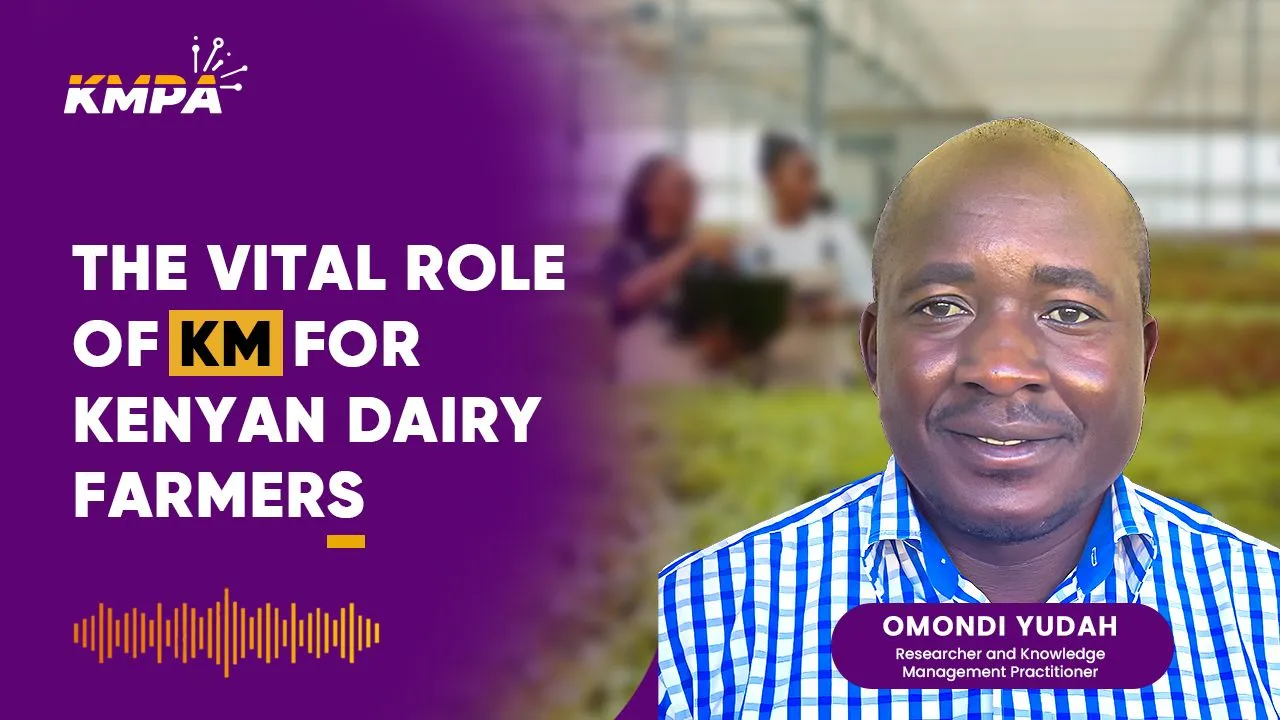In episode six of the Knowledge Management Podcast in Africa (KMPA), Kabod Group conversed with Mr. Omondi Yudah, a PhD candidate specialising in knowledge management (KM) in agriculture. The discussion centred on implementing KM practices among small-holder dairy farmers in Kenya and their profound impact on productivity, sustainability, and the broader development sector in Africa. The Crucial Role of Knowledge Management for Small-Holder Farmers
Mr. Yudah mentioned that agriculture, especially dairy farming, is inherently knowledge-intensive. As such, smallholder farmers must access and effectively utilise precise information to enhance productivity and implement best practices. Knowledge management practices—such as knowledge acquisition, sharing, retention, and utilisation—are vital for these farmers, particularly in rural areas where resources and support are often limited. Boosting Productivity and Ensuring Sustainability
Mr. Yudah acknowledged that KM practices have significantly boosted the productivity and sustainability of small-holder dairy farms. Farmers have seen notable improvements in daily productivity by adopting best practices and becoming more informed about various aspects of dairy farming. KM also plays a critical role in risk mitigation, skill, and capacity development, fostering collective learning within farming communities. Moreover, it helps farmers adapt to environmental changes, making their practices more resilient and sustainable.
Impact on the Development Sector
The KM practices of small-holder dairy farmers contribute significantly to the development sector in Kenya and East Africa. KM practices positively impact the agricultural sector by improving productivity, enhancing skills and capacity, and promoting collective learning. They also help farmers adapt to changing environmental conditions, contributing to the overall development of rural communities.
Overcoming Challenges in Knowledge Management
Implementing effective KM practices among small-holder farmers is not without challenges. Issues such as overreliance on traditional knowledge, competition, knowledge hoarding, fear of sharing untested knowledge, and local politics can impede progress. To combat these challenges, advocacy and civic education programs promote a culture of trust and knowledge sharing. Technological innovations, including the Ndume Digi Cow and Maziwa Plus Diary Management Software, are being utilised to enhance KM practices. However, Mr Yudah lamented that low literacy levels in rural areas hinder these technologies’ widespread adoption.
Addressing Literacy and Technology Adoption
Mr. Yudah expressed hope that, given the importance of these technologies, more farmers would eventually embrace them. He mentioned that KM encourages learning from mistakes and best practices, combining indigenous and scientific knowledge to create a comprehensive knowledge base. He emphasised the need for increased investment in research to document agricultural expertise and make it publicly accessible.
Future of Knowledge Management in Agriculture
Despite current challenges, Mr. Yudah remains optimistic about the future of KM in agriculture. He advocates for broader integration of KM into agricultural activities and foresees significant upscaling and progress. However, he acknowledged that the future of KM for small-holder farmers faces obstacles such as benchmarking and facilitation. He concluded that survival in farming hinges on effective knowledge management, underscoring the knowledge-intensive nature of agriculture.
As KM evolves, it can substantially improve agricultural practices and outcomes across the continent.
You can listen to the podcast episode here. If you are interested in speaking on the podcast, please contact us at com@kabodgroup.com. For more updates and episodes, follow the podcast on our YouTube channel





